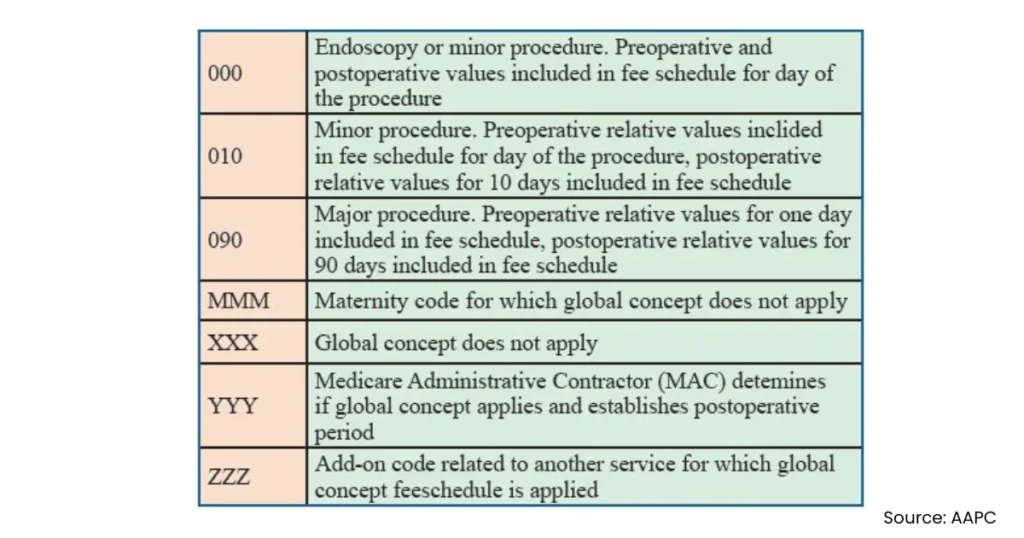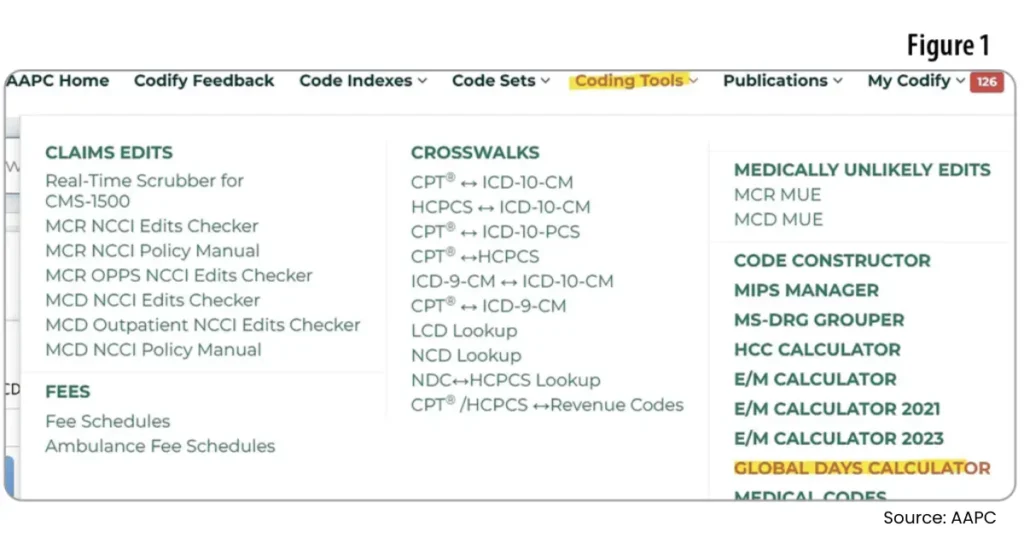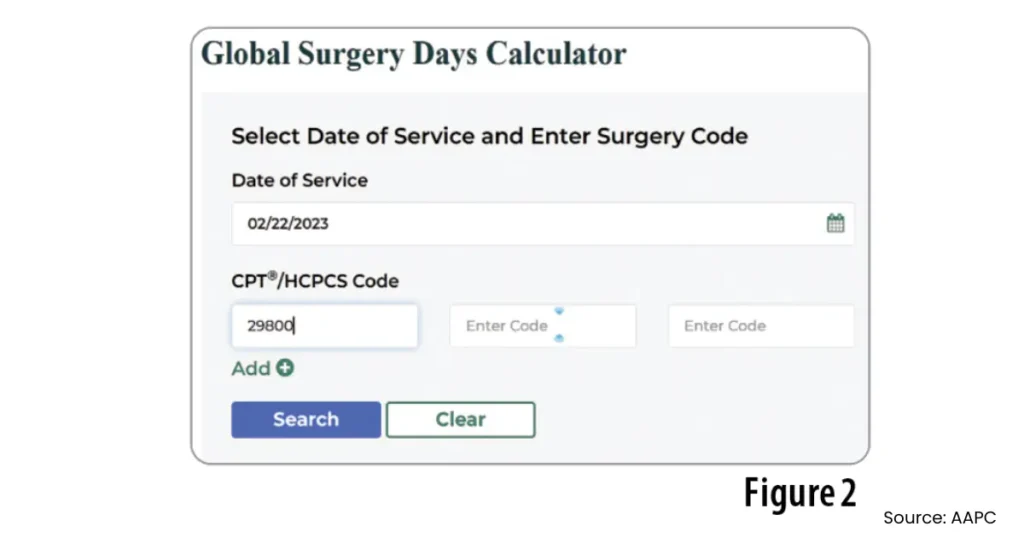Global Period in Medical Coding: Medical coding is like the bridge between doctors and insurance companies. It helps translate medical services into codes that insurance providers understand and pay for. But one part of this process often confuses even experienced coders – and that is – the Global Period in Medical Coding.
So, what exactly is this? In very simple words, the global period is the number of days after a surgery when all routine follow-up care is already included in the payment for that surgery. During this period, you cannot bill separately for the regular, related services.
Now you might be thinking, “Why is this so important?” Because if you don’t know the rules around the global period, you could either underbill (losing money) or overbill (risking compliance issues and claim denials).
In this blog, we’ll break it down step by step, explaining what is global period in medical coding, how to use the Medicare global period lookup, and when to apply the correct modifiers. The goal is to make this concept crystal clear for coders, whether you’re in India, the US, or anywhere else in the world.
What is Global Period in Medical Coding?
Let’s start with the basics. What is global period in medical coding?
In simple terms, the global period refers to the time frame following a surgical procedure when all routine care related to that surgery is considered part of the original payment. This means you cannot bill separately for standard follow-ups, wound checks, or other normal recovery-related visits.

For example:
- If a surgeon performs a gallbladder removal, the follow-up care (like suture removal or post-op consultation) during the global period is included in the surgical package.
- If the patient comes in for an unrelated issue, such as a skin rash, during that time, that visit can be billed separately, but only with the right modifier.
So, when someone asks, “What is global period in medical coding and why is it important?” the answer is clear: it defines billing boundaries and ensures fair reimbursement.
Types of Global Periods
Not every surgery has the same global period. In fact, the global period can vary widely depending on the procedure. Here are the main categories:
1. 0-Day Global Period
- Covers only the day of surgery.
- No pre-op or post-op care is included.
- Example: Some diagnostic or minor procedures.
2. 10-Day Global Period
- Includes the day of surgery and the following 10 days.
- Typically applied to minor surgical procedures.
- Example: Simple wound repairs or skin lesion removals.
3. 90-Day Global Period
- Covers the day before surgery, the day of surgery, and 90 days after.
- This is common for major surgeries.
- Example: Orthopaedic joint replacements, open-heart procedures.
When coders ask what is global period in medical coding in practical terms, it boils down to these three categories. Each type affects how you handle claims, modifiers, and follow-up visits.
Medicare Global Period Lookup: How Do I Know the Global Period for a Particular Surgery?
Now, how do you know the global period for a particular surgery? That’s where the Medicare global period lookup comes into play.
The Centers for Medicare & Medicaid Services (CMS) provide a Physician Fee Schedule (PFS) look-up tool. By entering the CPT code, you can check the assigned global period, whether it’s 0, 10, or 90 days.
For Indian coders working with international claims, this tool is invaluable. Even though India has different billing systems, many medical coding professionals here work with US-based healthcare clients. Understanding the Medicare global period lookup helps in accurate claim submissions and avoids payment errors.
As one CMS guide puts it: “Accurate use of global periods supports efficiency and prevents unnecessary billing disputes.”
So, whether you’re coding in India or the US, always rely on the Medicare global period lookup to double-check your CPT codes.
Read More: Online Medical Coding Courses with Certificates

What Modifier to Use for Global Period?
This is where many coders get stuck. They know the global period but aren’t sure how to bill services that occur inside it. The key is using the right modifier.
Here’s a simple breakdown of what modifier to use for global period:
- Modifier 24: When the patient comes for an unrelated E/M (evaluation and management) service during the global period.
- Modifier 25: When a significant and separately identifiable E/M service is performed on the same day as a procedure.
- Modifier 58: For a staged or planned procedure during the global period.
- Modifier 78: For an unplanned return to the operating room for a related procedure.
- Modifier 79: For an unrelated procedure during the global period.
Example:
- If a patient had gallbladder surgery (90-day global period) and comes back after 2 weeks with a throat infection, you’d use Modifier 24 because the visit is unrelated to surgery.
- If the patient needs another unrelated surgery, you’d use Modifier 79.
This is why coders often ask, “What modifier to use for global period?” The answer depends on the situation, but knowing these five modifiers makes life much easier.
Common Mistakes Coders Make
Even with clear guidelines, errors happen often. Some common pitfalls include:
- Not using the Medicare global period lookup before assigning claims.
- Billing for routine post-op care without realising it’s bundled.
- Applying the wrong modifier during the global period.
- Confusing unrelated conditions with related ones in the same period.
The best way to avoid these mistakes? Stay updated, always verify CPT codes, and understand what is global period in medical coding in detail.


Examples For Your Practical Understanding
Sometimes examples make things easier:
- Case 1: A patient undergoes cataract surgery (90-day period). On day 40, they come back for a skin infection. Bill separately with Modifier 24.
- Case 2: A patient has a mole removal (10-day period). On day 5, the patient revisits for suture removal. Already covered, cannot bill separately.
- Case 3: A patient undergoes knee replacement (90-day period). On day 70, they need another planned knee procedure. Use Modifier 58.
These cases show how understanding the Global Period in Medical Codinghelps in real-life coding.
On A Final Note…
The Global Period in Medical Coding is not just a technical detail; it’s one of the foundations of accurate medical billing. If you’re a coder, always remember:
- Know what is global period in medical coding for the procedure you’re billing.
- Always use the Medicare global period lookup instead of guessing.
- Apply the correct modifiers when services fall inside the global period.
- Avoid common mistakes like billing for bundled services.
Think of the global period as a safety net, it tells you exactly what’s included and what isn’t. Get it right, and you’ll save your practice time, money, and stress.
FAQs
Q1. What is global period in medical coding in simple words?
It’s the set number of days after surgery during which all related routine care is included in the surgery’s payment.
Q2. How do I check the global period for a surgery?
Use the Medicare global period lookup tool with the CPT code.
Q3. What modifier to use for global period when the visit is unrelated?
Use Modifier 24 for unrelated E/M services or Modifier 79 for unrelated procedures.
Q4. Are all surgeries assigned global periods?
No. Some minor procedures may have a 0-day global period.
Q5. Can global periods differ between insurers?
Yes, Medicare sets standard rules, but private insurers may have slight variations.

